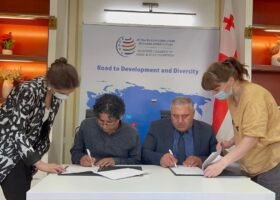Georgia - Türkiye – Azerbaijan –Regional Cooperation and Future Perspectives
Georgia — Türkiye – Azerbaijan –Regional Cooperation and Future Perspectives
- 26 января, 2022
- Пост от: Kati2022

Georgia, Türkiye, and Azerbaijan have a long history of economic and political cooperation, largely beginning with the collapse of the Soviet Union, when Türkiye, under changing geopolitical realities, was able to engage in active cooperation with countries in the Caucasus region. Türkiye was the first country to officially recognize the independence of Georgia and Azerbaijan after the collapse of the Soviet Union[1]and established diplomatic relations. During this period, Türkiye’s aspirations to expand its economic and political influence in the Caucasus and Central Asia were actively supported by the West, which, due to the political context of the Cold War, was a member of the North Atlantic Alliance and a candidate for EU membership in the 1990s. The countries of the Caucasus and Central Asia saw Türkiye as a partner that would, in the first place, economically and politically fill the place liberated from Russia.
The Caucasus region, more specifically the combination of Georgia and Azerbaijan, has become important for Türkiye primarily in terms of energy resources. Azerbaijan’s oil and natural gas have played and continue to play a major role for Türkiye. At the same time, Azerbaijan has an important transit function, which is primarily related to the transit of oil and natural gas from Central Asian countries. There are also energy carriers passing through the territory of Azerbaijan, which supply Iranian oil and natural gas to the surrounding areas, and thus, Azerbaijan is an important transit point in terms of handling Iranian energy resources.[2] In terms of energy transit, Georgia became a major transit point after the First Nagorno-Karabakh War, after the closure of the Turkish-Armenian and Armenian-Azerbaijani borders, through the Baku-Tbilisi-Ceyhan oil pipeline and the Shahdaniz gas pipeline. Supplies to Türkiye. Despite the Turkish-Armenian talks that began after the second Karabakh conflict on the normalization of relations between the two countries and the so-called Due to the opening of the Zangezur Corridor, the initial stage of the Turkish-Armenian negotiations and the mountainous terrain of the Zangezur / Syunik region, which makes the construction of energy carriers expensive and time-consuming, it can be said that Georgia will maintain its transit function soon.
In addition to energy, Türkiye also plays an important role in the field of hydropower, where several important hydropower plants were built with Turkish investment, for example, Shuakhevi HPP or Paravani HPP. However, certain problems, such as opaque contracts or redistribution of generated energy, cause significant problems, especially among the local population, and have a negative impact on hydropower cooperation between the two countries.
Georgia’s transit importance is also quite large in terms of railways. For example, the Baku-Tbilisi-Kars railway, which started operating in 2017, plays a major role in transporting cargo coming from China, thus connecting China and Central Asia with both Türkiye and the continent of Europe through the Turkish railway infrastructure. Because of this, the railway, especially in Turkish sources, also acquired the nickname of the Silk Railway.[3]
Due to its favorable geographical location, transit importance and energy infrastructure, Georgia is an important economic partner for both Türkiye and Azerbaijan, and thus an important investment destination for both countries in various fields, given that both countries have significant economic knowledge and experience. In the fields, we can say that in addition to direct investments, cooperation with Türkiye and Azerbaijan can also transfer the knowledge and experience that these countries have in fields such as textiles or petroleum refining.
Especially important in this regard is the textile industry, which is one of the most developed industries in Türkiye and, consequently, the country has quite a lot of industrial potential and professional experience in this field. Which, in the future, can be quite significant in making up for the loss of industrial productivity and experience created after the collapse of the Soviet Union, and in this regard, can help Georgia develop its textile industry in the long run. It should be noted that Turkish investments in this field are actively entering Georgia and there are already sewing enterprises opened with Turkish investment, in cooperation with the state and local businesspersons. An important example of which is Adjara Textile, which has many garment factories throughout Georgia, and Kartli, under the name of textile, has begun to expand in eastern Georgia.[4] However, Turkish investments in the manufacturing sector also have obstacles, which are largely due to the Turkish factor and are directly related to Türkiye’s domestic political factors, including the depreciation of the lira and the unofficial employment of Syrian and Afghan refugees[5], which largely covered the financial benefits that Turkish investors should have had in Georgia. However, in terms of attracting professional knowledge in the field of textiles, Türkiye is still the most real potential investor and partner due to its territorial proximity and close relations between the two countries.
Another important industry in which Türkiye and Georgia can actively cooperate and which is of great importance, especially for the regions of Georgia, is the food industry. First, industrial production of second-tier products, such as canned food, juices, etc. In addition to increasing the cost of agricultural products grown in Georgia, it will also help to create the infrastructure and experience in Georgia that will be needed for the future development of the sector.
Tripartite cooperation between Georgia, Türkiye and Azerbaijan, primarily in the energy and transit fields, has significant potential, and despite the normalization of Turkish-Armenian relations, it is unlikely that Georgia’s territory will be important soon, given existing energy and infrastructure. In addition, Sharing experience and knowledge is also of great importance for the development of Georgia’s energy sector.
The potential details of the Georgia-Türkiye cooperation are much more comprehensive and have a great future, especially in the field of light industry and shipping.
Author: David Tsirdava
[1]Oran, Baskın (Ed.) — Türk Dış Politikası (Volume 1), İletişim Yayınları, 2002, p. 371
[2] https://www.jpost.com/middle-east/iran-news/iran-looks-to-political-gains-from-turkmenistan-azerbaijan-gas-deal-analysis-687405
[3] https://www.tcddtasimacilik.gov.tr/haber/611/
[4] https://report.ge/economics/kartli-tekstilshi-20-mln-laris-turkuli-investitsia-chaido/
[5] https://www.bloomberght.com/duzensiz-goclerle-kayit-disi-istihdam-yukseldi-2285882



























































































































